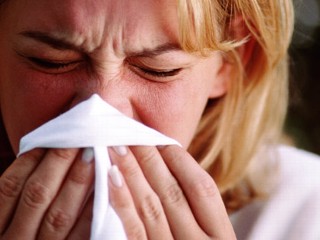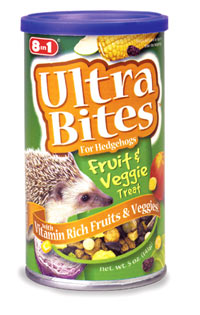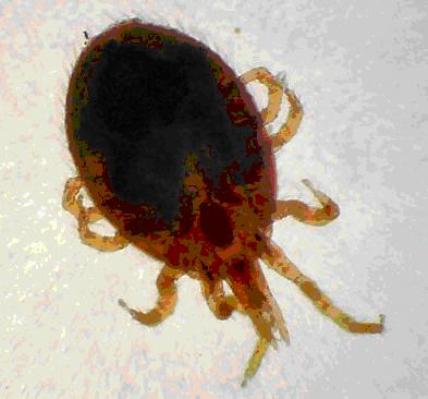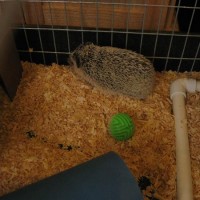Archive for the ‘General Advice’ Category
 I get a lot of e-mails and phone calls when temperature begins to fluctuate, especially during the Fall and Spring months. It seems that hedgehogs are not really happy when the temperature isn’t fairly stable for them. It can really stress them out and lead to things like quill loss, grumpiness, loss of appetite, weight loss and more serious things such as respiratory infections and attempted hibernation.
I get a lot of e-mails and phone calls when temperature begins to fluctuate, especially during the Fall and Spring months. It seems that hedgehogs are not really happy when the temperature isn’t fairly stable for them. It can really stress them out and lead to things like quill loss, grumpiness, loss of appetite, weight loss and more serious things such as respiratory infections and attempted hibernation.
Hedgehogs enjoy burrowing down into their bedding. If you think about it, a heated pad under the cage is the most natural way for them to get some extra warmth. In the wild, hedgehogs burrow down to a temperature that is comfy for them. In captivity, heated lamps or space heaters are not the best solution for heat. The heat is more difficult to keep stable and hedgehogs do not go out in the sun to bask like reptiles. For that reason, heated lamps are best suited for reptiles.
In the wild, hedgehogs are out and about during the coolest part of the day. It can actually get chilly in their natural habitat during the nighttime. For this reason, I feel it is important to create a warmer sleeping spot. If you place a small animal heated pad under their igloo, they will really appreciate it.
I recommend the K & H Small Animal Heated Pad.
 I thought I should do a post about power outages, since we have 32.5 inches of snow on the ground here and many are without power. Luckily, our power has stayed on and my hedgehog room has remained a steady 78-80 degrees. We have a generator, so I do not get as nervous as I did years ago when our power would go out, but I do keep a supply of hand warmers in case of an emergency. The hand warmers can keep your hedgehog warm for many hours or even days if necessary. I activate the warmer and slip it into a sock and tie the end. The warmer is placed in the hedgehog’s hideout and it keeps the area warm for 7+ hours depending on the type of warmer. Having some of these warmers on hand could possibly be a life saver. :)
I thought I should do a post about power outages, since we have 32.5 inches of snow on the ground here and many are without power. Luckily, our power has stayed on and my hedgehog room has remained a steady 78-80 degrees. We have a generator, so I do not get as nervous as I did years ago when our power would go out, but I do keep a supply of hand warmers in case of an emergency. The hand warmers can keep your hedgehog warm for many hours or even days if necessary. I activate the warmer and slip it into a sock and tie the end. The warmer is placed in the hedgehog’s hideout and it keeps the area warm for 7+ hours depending on the type of warmer. Having some of these warmers on hand could possibly be a life saver. :)
The simple answer is – Yes!
Definition
hy·po·al·ler·gen·ic
adj.
Having a decreased tendency to provoke an allergic reaction.
The American Heritage® Medical Dictionary
The definition of hypoallergenic may surprise some people. Hypoallergenic does not mean non-allergenic. Hedgehogs are not very likely to cause an allergic reaction, but it has been known to happen. Hedgehogs produce very little dander, which is the usual culprit for animal allergies. It is extremely rare that hedgehog dander produces any sort of reaction. Allergic reactions to hedgehogs are usually from small pricks of the hedgehog’s quills that have been contaminated with an allergen. (more…)






